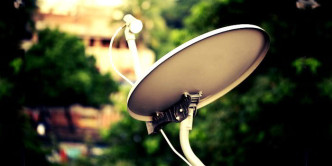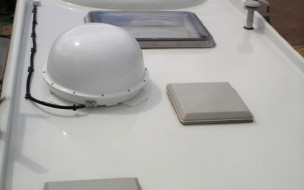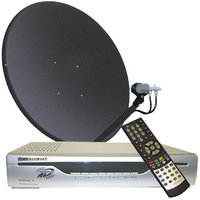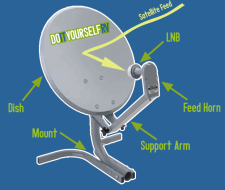
RV Satellite Television(TV) is a subscription service that you contract for a monthly fee. You must also purchase a satellite antenna (dish or dome) to capture the signal, and buy or lease the receiver that processes it for your TV.
Equipment costs for a satellite system can be anywhere from around $100.00 for a simple tripod-mounted dish to as much as $1800.00 for an in-motion dome system or automatic RV satellite dish. The receiver for the satellite signals is extra and may be leased from the satellite provider or purchased outright.
Some new RVs come equipped with a satellite dome or may be pre-wired for RV satellite TV service. Equipment may also be present in a used RV, but you still have to contract with a satellite TV service to utilize it. Getting set up for RV satellite service can be frustrating—the local satellite dealers rarely know much about mobile satellite service for RVs and many will not work on them at all.
An RV dealer or a store like Camping World is a better source for help in getting started with RV satellite TV service, but they tend to sell canned packages that may or may not be exactly what you want.
All forms of RV satellite TV need a clear view of the southern sky (the satellites are all located over the Equator, pretty much due south of Texas). For those of you who love to camp under trees or nestled in a mountain valley, you may find that the satellite is not visible from your location and, therefore, no RV satellite TV is available.
This requirement affects your choice of equipment as well as your choice of campsite. And as you move further north, the satellite dish as to be pointed every lower in elevation (upward angle), placing more things in the path of the signal.

In addition to being blocked by trees or adjacent mountains, all satellite service suffers from “rain fade.” This is caused by water droplets in the air degrading the signal to the point where it becomes unusable.
Dome type RV satellite TV antennas are more susceptible to rain and dew than are the open face dish types because the water droplets accumulate on the dome itself.
All RV Satellite TV service is not the same across North America and this creates difficulties for RVers who travel widely. The local channels for most regions are broadcast only to that region, and specialty channels such as HDTV programming or HBO may be handled by different satellites than the mainstream channels.
You have to be able to find the right satellite(s) for your current location and programming package, and you may have to receive signals from multiple satellites to get everything you want. Automatic equipment is available to handle most of these chores, but at a price, of course. On the other hand, if you stay mostly in one local area and want only local network channels and a few popular national ones, you may be able to meet your needs with fairly basic – and inexpensive – equipment.
[asa]B002N5EFJC[/asa]
Figuring out what will suit your TV-watching needs can be complex.
You will need to determine answers to these questions:
- Which RV satellite TV service provider & programming?
- Buy or lease equipment?
- SDTV or HDTV?
- Will you stay in one area or travel widely?
- Local stations or national networks only?
- RV Satellite Dish Options: Portable antenna or fixed mount?
- Automatic or manual set-up?
I’ll try to explain these enough so that you can choose from among the many available options.
RV Satellite TV Services

Dish has traditionally been a bit more friendly to RVers, so some choose Dish for that reason alone. Another factor is that Dish currently is the only one with a Pay-As-You-Go plan that allows you to turn your service on for just a month at a time. This can be a good cost-saver if you only need RV satellite TV during the summer months. However, you have to buy your own equipment up front (no lease). Direct TV allows you to suspend your service for up to 6 months in any 12 month period, but that may still leave you paying for some months of service you don’t need.
Buy or Lease?

The RV satellite receiver, the box that processes the satellite signal and sends it to the TV, is unique to the satellite service and also for SD (Standard Definition) or HD (High Definition). It also contains the DVR, if you want one. Be careful when buying one of these in a retail store – the fee you pay may not give you actually ownership. Often the price is just a retailer handling fee and you still pay $6-$10 per month to the satellite service for the equipment lease.
Ask about this before you buy.
The receiver connects to your TV via cables and you may have to route new cables for the hook-up. An HDTV receiver requires HDMI or Component Video cables to carry the HD signal to the TV – plain old coax won’t do the job.
[asa]B002N5RZOY[/asa]
Standard or High Definition RV Satellite TV?
Chances are your RV TV is smaller than what you enjoy at home. On small screens HD isn’t a whole lot better than SD, but starting around 26” it begins to make a very noticeable difference. As the TV gets larger, the lines that paint the picture on the screen get further apart and picture quality worsens. Thus a larger digital TV makes higher definition (HDTV) more desirable.
The RV satellite TV services charge a substantial premium to receive their special HD channels, so cost is a factor in this decision. So is the type of antenna required to receive HD (more on this later).
Still, an SDTV signal on a small-to-medium size LCD or LED TV will look pretty darn good. Don’t feel that you absolutely must have HD unless your TV is fairly large. And if your TV is analog rather than digital, don’t worry about HD at all.
If HDTV is a requirement for you, be aware that Direct TV broadcasts their HDTV channels via a satellite type known as Ka band service. There is no way to receive a Ka band signal using a dome type satellite dish, so your choice of satellite antenna will be limited to an open-face dish (more on this later).
Homebody or Traveler?

As mentioned previously, local TV channels for a metropolitan TV market area) are broadcast only to that area. This is called a “spot beam” and the area covered is typically an oval and maybe only 100 x 200 miles.
In some northern areas it may be much larger. Think of a spot beam as a flashlight in a dark room. If you shine it at an angle to the wall, the lighted area distorts from a circle to an oval. It also gets dimmer near the edges, until it is finally dark.
If you stay close enough to home you can get all the same channels, but if you move out from under your spot beam, you no longer can see the signal for your area. The “locals” will be different stations than at home and you may even need a different dish to receive them (more LNBs or an automatic aiming dish). Network shows may also appear at different times. The upside of that is that the weather is for your current location, not your “home” which may be hundreds of miles away.
In some areas you can pick up all local and major national channels with a single LNB dish but in others two or more may be needed for full service. In a few areas Direct TV uses as many as 5 LNBs per dish to get their full channel line-up in HDTV. If you travel widely, you may want a more sophisticated RV satellite dish that can automatically find the satellites needed in that area. Article Continues on the Next Page.




Anyone have any advice- have a horse trailer that came with an antenna but no dish or satellite system. It’s pre wired. There is a tv and we have Direct TV at home. I have spoken to Direct and they said I’d need a wine guard system mounted. I can use a receiver from the house. I’m a bit at sea. I mostly go to horseshoe grounds but am hoping to take it to very remote areas this summer . All I care about are the news channels- cable CNN, fox etc. I’d like to get the direct tv channels we get at home. What to buy? I’m in the Ocala area. Any help appreciated. My fear of getting the wrong thing has made me get nothing for months!
Yes. I have a friend that has an rv that he uses for on-the-road work. He uses Direct TV…but Dish does it too. Dish has an option where you can turn it on one month and off the next. Direct TV you can turn off only 6 months of the year.
Hi, Gary. Just purchased a 2016 Coachmen Mirada 35ls that is pre-wired for Satellite. I have DISH at home, so plan to go with the Wineguard Trav’ler. The rv has three TVs. Is it true to get any kind of HD signal to the tv, I will need to run HDMI connections from the (211k) cable boxes to the tv. That an rb6 coax from the box to the TV would deliver an HD picture. Is this correct?
We just purchased a used motor home that was equipped with in-motion satellite. We called Direct out to hook us up. The tech told us that our system used the old type receiver which was obsolete. He said there was something that needs to be done to the satellite in order for it to work with the new Direct receivers. We went back to the place we bought the motor home and the young man tells us we might as well get rid of it. Does anyone know what needs to be done to our in motion satellite so we can hook up to a service and it actually work? Help is appreciated.
is there no way around the local spot beam..I am told that Austin Texas area has a 200 mile spot and my deer lease is 210…I get everything but local channels. I use just a satellite tripod dish which works well inside the 200 mile. Will a more expensive automatic dome work better? I do not care if it is the local channels in the area of the lease..would just like to get ABC, NBC, CBS and Fox for football games etc
Yes, I do this all the time. Got a SD box from ebay for $30 with remote. Make sure you call DIRECTV to make sure the box is not leased. If leased, it will not work. They will send you a card, etc to make it work. I recommend a regular dish. Buy one from ebay for <$100. Once you get in the groove of setting it up, it's a 15 min job. If you go HD it's more complicated setup, and I have no experience here. Also weather doesn't make a difference. I strap it to trees and poles in high wind, and go through torrential rain and no big deal.
I just went back to Direct TV at my home. The tech installed a new HD dish and he left the old one, it isn’t HD. I asked him if I could use it with my camper at my hunt camp and he said to call and get a box,can’t remember number rt now, he said it could be added to my home bill for about $5 mo. Has anyone else done this. Camp is 75 mile from my house. I’m just wondering if it will work. Thanks Mike E.
We have Dish home Service and are no doing some RVing
We purchased a Disk VIP211z an a Winegard G2 antenna and pay for it on our regular monthly Dish bill.
When we travel more than a short distance and set up the antenna and receiver we get an error message instructing us to call the help line. Apparently when you change location when travelling, you have to call and advise dish and they have to reactivate your receive. This can take a 10 min call and another 10 minutes for the receiver to get the activation message. Adding a 10 min set up of the system outside the RV, this can result in 30 minutes in total just to watch a few minutes of TV.
I asked the Dish service representative if there isn’t a simpler way to do all this each time. The informed me that the phone call was necessary and the only option. I wonder what people with in motion receivers do to avoid being deactivated as they roll down the highway. I also wonder what I would do if I were camping in a remote area with no cell service if the received needed to be reactivated.
Hi I have DTV at my home but would like to buy a second receiver for the RV. Would a HR24-100 HD DVR Digital Satellite Receiver Direct TV be a good choice.
Thank you Don in Truth or Consequences New Mexico
het gary i have a motorhome vacation home plus my primary residense i live there about 7 months /yr vaca home 5months/yr and go rving 2 to times /yr would like to use service with all three md de area any suggestions
Hi Gary, I am a novice at many things concerning satellite systems. I do not even have one at home. I use just cable. Recently we bought a new RV with the normal system hook ups Cable/Air. As you can imagine we don’t get a thing. Should I buy a HD antenna (conversion kit) to connect to my air antenna or invest into satellite which I don’t a thing about. No way would have my husband connect either system. (But sometimes I find these companies don’t know how to do it either. What a shame.) I need your help! Thank you Penny
Great detail Gary, thanks. Question though. Currently have directv SD (sat 101) with kingdome 9702, non in-motion. Dome collects moisture inside and destroys signal. I have dried out the unit numerous times and sealed the screws. Without rain or wind, while stationary, in a marine climate on Vancouver Island the dome collects moisture in about a week, causing removal and drying. Is this a known problem that King Controls doesn’t discuss? King dome wants to sell me an upgraded dome unit and I am investigating an open array system. Not considering price, which is best unit in your opinion. Thank you in advance for your help. Steve
Thank you,Gary for the great article,you answered all the question’s one would have on RV Satellite service,equipment,etc. Thank You. again
Chris Davis